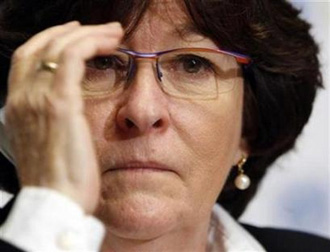
|
 |
 |
 Editorials | Issues | February 2008 Editorials | Issues | February 2008  
Dangerous to Use Mexico Army Against Drug Gangs: UN
 Anahi Rama - Reuters Anahi Rama - Reuters
go to original


| | High Commissioner on Human Rights Louise Arbour adjusts her glasses during a news conference on a year-long initiative to commemorate the 60th anniversary of the Human Rights Declaration at the United Nations European headquarters in Geneva December 10, 2007. Mexico risks committing more rights abuses if it continues the 'dangerous' policy of using its military to fight brutal drug gangs, Arbour said on Tuesday. (Denis Balibouse/Reuters) | | |
Mexico City - Mexico risks committing more rights abuses if it continues the "dangerous" policy of using its military to fight brutal drug gangs, the U.N. High Commissioner for Human Rights said on Tuesday.

"I understand there are those who say that at times you have to turn to a more powerful force such as the army, but it seems to me that in the long term it is frankly dangerous," Louise Arbour told television network Televisa during a visit to Mexico.

"The army should not be doing the job of the police," she added.

President Felipe Calderon has mobilized some 25,000 Mexican troops since taking office in December 2006 to try to crush powerful drug cartels that are warring over lucrative smuggling routes to the United States.

Calderon has won praise at home and in Washington for using the military, as Mexico's corrupt police forces side with drug gangs, especially in states bordering the United States.

But Calderon has faced criticism from rights groups such as Amnesty International. Mexico's Human Rights Commission also says heavy-handed soldiers have committed abuses. A Mexican court last year sentenced at least four soldiers to up to 40 years in prison for rape in 2006.

More than 2,500 people were killed in Mexico in drug violence in 2007 amid a drive by an alliance of cartels headed by Joaquin "Shorty" Guzman - Mexico's most wanted man - to dominate the Mexican drug trade against rivals.

Mexico says the army will continue its fight against the cartels until the country's police forces have been cleansed and retrained to take over the military's job.

(Editing by Philip Barbara) | 
 | |
 |



